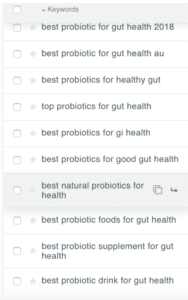SEO is Content Marketing

A few years ago, SEO and Content Marketing were two completely separate things.
First, you would write a blog post, then optimize it for Google. Blog planning/writing and SEO optimization were two distinct activities that were thought about separately with very little overlap.
But today, in 2019 with RankBrain, and billions of searches, and Voice Search, and gazillions of content producers and EAT, SEO + Content Marketing are merging. They are a coordinated effort and need to be considered together as part of a strategic marketing plan.
In order to grow qualified organic traffic, you have to combine your content marketing with your SEO efforts. Treating them as separate campaigns isn’t going to provide you with as big of a traffic increase as combining them into one campaign will. — Hubspot
Before, say 2-3 years ago, SEOs would take high performing pages and incorporate keywords into them, the idea was to have specific pages rank for specific keywords. It was a keyword-centered content strategy.
A common practice was for sites to produce a massive amount of short-form content stuffed with keywords.
But now, because Google has put a large emphasis on usability and quality, I recommend a content strategy that is centered around the audience first and a quality long-tail keywords second.
It is helpful if you think about Content Marketing and SEO are two sides of the same coin.
The focus should be about well researched, quality content. It’s about knowing your expertise in your industry, and understanding your audience. It’s about tying this knowledge into your content to make it irresistible to your readers and to search engines.
Move to an audience centered content strategy.
Simply put, when you build a content strategy around your audience, the content is highly informative, entertaining, engaging and is highly valuable to the reader which turns them into raving fans and paying customers.
Let’s get practical here. Let’s say you are going to write an article on The Best Probiotics for Improving Gut Health. Instead of starting the article with keyword research, think about your audience first.
What questions does your audience have? What insights can you give them? What do you think they will be searching for? Here are some ideas that I have brainstormed:
- What are probiotics and how to they impact gut health?
- Are there different kinds of probiotics, what are the advantages or disadvantages of them?
- Do different people need different probiotics?
Pro Tip: Be sure to put these questions as H2 headlines in your post and fully answer each question.
In 2017, a Moz study determined that nearly 8% of all Google inquiries were written in the form of a question and that is expected to rise as voice search becomes more popular. (Alexa, how many pounds do 5 elephants weigh?)
Next, do keyword research. Aim for two long tail keywords per post.
What are long-tail keywords?
Long-tail keywords are 4-6 word phrases that keep your post focused on the specific goals of your audience. To find the best long-tails I always use KW Finder.

Website visitors who click on your site after using long-tail search terms are more likely to read the whole blog post and then seek more information from you than users who find you using 1-2 generic words.
In other words, you’ll generate right type of traffic if target keywords that are more specific and are longer.
Pro Tip: Include these keywords in a few specific areas of your post: The Title, H2 headline and the Meta Description.
For more tips on how to optimize a blog post read this Guide for Onsite Optimization.Blogging helps boost SEO quality by positioning your website as a relevant answer to your customers’ questions. Blog posts that specifically use a variety of on-page SEO tactics can give you more opportunities to rank in search engines and get customers to visit your site. — Hubspot
Next, think about what else your audience would like to read. Add supporting links to your article. This is a huge help for both your readers and for Google.
- It boosts your EAT by showing that you are a subject matter expert
- It increases pages per session which is a significant ranking factor for Google
- It increases dwell time which is another huge ranking factor
If you haven’t watched the video on The Three Things that Google Really Cares About, do it now.
I am hoping that you begin to see the relationship between SEO and content marketing, they are separate but very much related.
Keywords are the bridge that connects Google with searches and SEO is keywords and content marketing requires keywords to be content marketing.
So if you have skipped to the bottom because TL;DR: know this.
Content Marketing and SEO are not two separate things– they are closely tied together.
Instead of having a keyword-centered blog strategy, have an audience-centered strategy.
